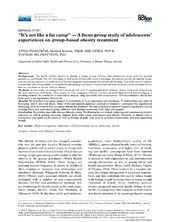| dc.contributor.author | Engström, Anna | en_US |
| dc.contributor.author | Abildsnes, Eirik | en_US |
| dc.contributor.author | Mildestvedt, Thomas | en_US |
| dc.date.accessioned | 2017-08-04T11:05:27Z | |
| dc.date.available | 2017-08-04T11:05:27Z | |
| dc.date.issued | 2016 | |
| dc.Published | Engström, Abildsnes E, Mildestvedt T. "It's not like a fat camp" - A focus group study of adolescents' experiences on group-based obesity treatment. International Journal of Qualitative Studies on Health and Well-being. 2016;11:32744 | eng |
| dc.identifier.issn | 1748-2623 | |
| dc.identifier.uri | https://hdl.handle.net/1956/16214 | |
| dc.description.abstract | Background: The health burden related to obesity is rising among children and adolescents along with the general population worldwide. For the individual as well as the society this trend is alarming. Several factors are driving the trend, and the solution seems to be multifaceted because long-lasting treatment alternatives are lacking. This study aims to explore adolescents’ and young adults’ motivation for attending group-based obesity treatment and social and environmental factors that can facilitate or hinder lifestyle change. Methods: In this study, we arranged three focus groups with 17 participants from different obesity treatment programs in the west and south of Norway. The content in these programs differed, but they all used Motivational Interviewing as a teaching method. We conducted a data-driven analysis using systematic text condensation. Self-determination theory has been used as an explanatory framework. Results: We identified four major themes: 1) motivation, 2) body experience and self-image, 3) relationships and sense of belonging, and 4) the road ahead. Many of the participants expressed external motivation to participate but experienced increasing inner motivation and enjoyment during the treatment. Several participants reported negative experiences related to being obese and appreciated group affiliation and sharing experiences with other participants. Conclusion: Motivation may shift during a lifestyle course. Facilitating factors include achieving and experiencing positive outcomes as well as gaining autonomy support from other course participants and friends. Obstacles to change were a widespread obesogenic environment as well as feelings of guilt, little trust in personal achievements and non-supporting friends. | en_US |
| dc.language.iso | eng | eng |
| dc.publisher | Co-Action Publishing | eng |
| dc.rights | Attribution CC BY | eng |
| dc.rights.uri | http://creativecommons.org/licenses/by/4.0 | eng |
| dc.subject | Weight management | eng |
| dc.subject | motivation | eng |
| dc.subject | self-determination theory | eng |
| dc.subject | Adolescents | eng |
| dc.subject | lifestyle | eng |
| dc.title | "It's not like a fat camp" - A focus group study of adolescents' experiences on group-based obesity treatment | en_US |
| dc.type | Peer reviewed | |
| dc.type | Journal article | |
| dc.date.updated | 2017-05-10T07:54:40Z | |
| dc.description.version | publishedVersion | en_US |
| dc.rights.holder | Copyright 2016 The Author(s) | |
| dc.identifier.doi | https://doi.org/10.3402/qhw.v11.32744 | |
| dc.identifier.cristin | 1422019 | |
| dc.source.journal | International Journal of Qualitative Studies on Health and Well-being | |

